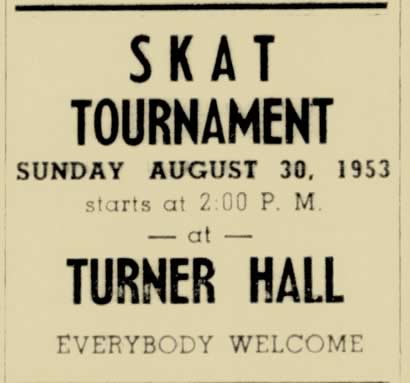Books by
Michael Barr
Order Here: |
|
Skat
was once a popular card game in the German Hill Country, but good
luck if you are looking for someone who knows how to play it. You
may have an easier time finding someone who speaks Latin or can balance
a checkbook.
The game of skat (pronounced 'scot') originated in Altenberg, Germany
in the early 19th century when members of the local card players'
club combined elements of a popular Italian game called Tarock with
another game called Schafkopf (sheep's head).
The game they invented is played by 3 players. The deck is 32 cards
with deuces through sixes taken out. Each player gets 10 cards. The
players bid on their ability to take tricks. The top bidder gets the
2 extra cards and then discards two. That discard is called the "skat."
Spread by students from the University of Leipzig, skat quickly became
the most popular card game in Germany, a country that takes its card
playing seriously. Just about the only Germans not hooked on Skat
were the Nazis who discouraged the game. I guess they were afraid
that thinking might catch on.
Skat is a complicated game and maybe the most difficult card game
to learn. I'm told it takes years of practice to get really good at
it. Experts say the game requires patience, calculation skills, recall
and "a sublime grasp of strategic and technical thinking." An ability
to read facial expressions is a plus.
Most really good skat players started playing the game when they were
young. They learned it at home watching their fathers and uncles play
it at the dinner table.
Experts say about 15% of the game is luck and 85% is skill and psychology.
For the most part it is a supreme challenge of "wits, logic, imagination
and card sense."
Skat came to the United States with the German migration in the 19th
century. It is the only card game other than bridge organized on a
national scale with regular competitions. Players formed the North
American Skat League in St. Louis in 1893.
In the Texas Hill
Country the love of the game may have been nourished by lonely
isolation and by the drudgery of manual labor. In a world where mental
stimulation could be hard to find, skat was a way to give the brain
a workout.
Skat tournaments were common all over the Hill
Country. There are stories of the old Germans playing for beer
at Fischer Store. Competition was fierce. |
 |
Turner
Hall Skat Tournament Announcement
Courtesy
Fredericksburg Standard |
Skat was an
important form of recreation in early 20th century Fredericksburg.
Families would gather at St. Joseph's Hall for an entire day of skat,
pinochle, high five or canasta. Children played a dice game called
bunco.
There were skat tournaments at Turner Hall
in Fredericksburg.
Entry fee was $1. There were cash prizes for the winners, but the
money was secondary. This competition was bigger than money. It was
about bragging rights.
Turner Hall in Fredericksburg
hosted the State Skat Tournament in 1928 and again in 1963. In the
1950s there was a skat-pinochle tournament every 3rd Saturday at Herman
Sons Hall. There were community card parties (skat, pinochle,
bridge, high five and bunco) in the basement at St. Mary's School.
Stonewall
held Skat tournaments at the school gym.
There were some very good local players. The November 1941 issue of
The National Skat Magazine carried a story and a picture of
Dr. Lorence Feller of Fredericksburg
who had an impressive score at a Sheboygan County Skat League Tournament
in Wisconsin.
Then after WWII
the game went on a steady decline. The rock and roll generation wasn't
interested in playing cards. The difficulty of the game also worked
against it. Fewer young people were willing to put in the time it
took to really get good at it.
There are still skat tournaments in Seguin
and New
Braunfels, but not so much in Fredericksburg
anymore. Skat has gone the way of 9-pin
bowling and cursive writing. There were efforts to teach the game
to the younger generation, but it wasn't in the cards. |
© Michael
Barr
"Hindsights"
December 12, 2022 Column
Source:
"Great Skat,"New Braunfels Zeitung, September 12, 1999.
"Dr. Feller Places in Wisconsin Skat Tournament," Fredericksburg
Standard, November 27, 1941.
"What's the Deal," New Braunfels Zeitung, February 9, 2003.
|
|
|
